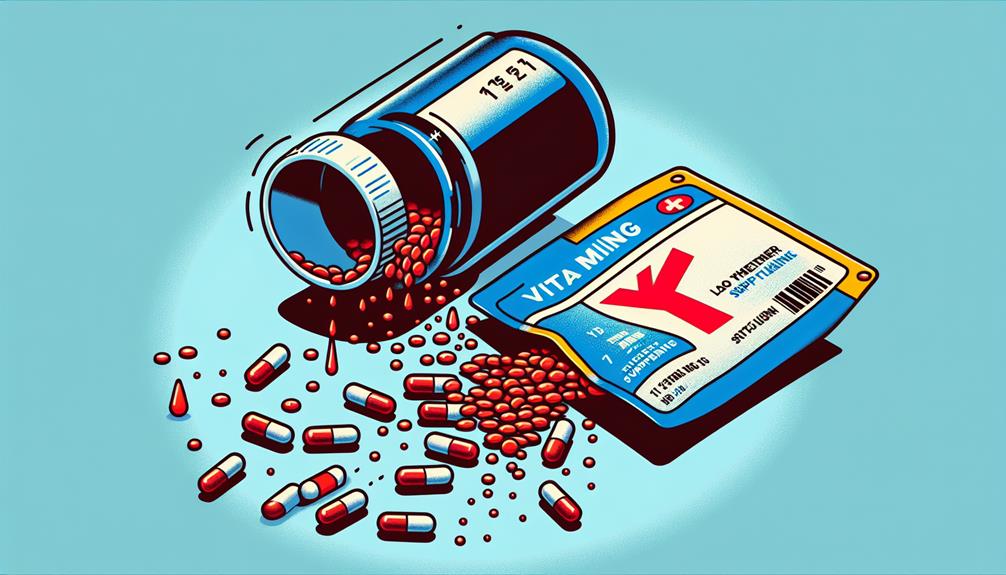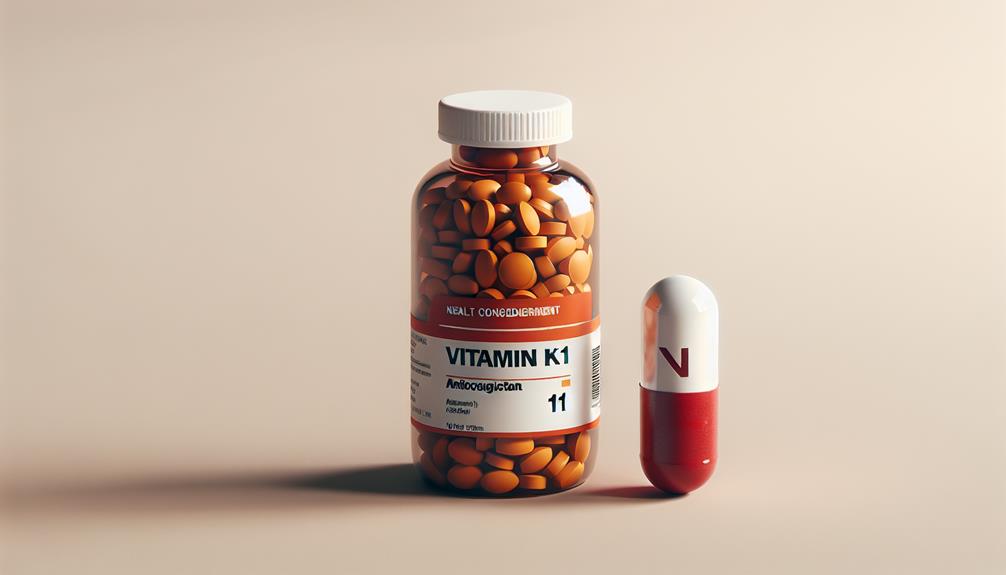





Understanding how vitamin K1 supplements affect anticoagulant medications is crucial for optimizing your treatment. Vitamin K1 counteracts the actions of anticoagulants, potentially impacting blood clotting regulation. Altered vitamin K1 levels can disrupt the balance needed for effective therapy, necessitating careful dosage adjustments and monitoring by healthcare providers. Educate yourself on the importance of consistent vitamin K intake and maintain open communication with your healthcare provider for tailored guidance. Make informed decisions to guarantee a balanced therapy approach that supports your overall health and well-being. Further insights into this topic can offer valuable guidance for your treatment regimen.
Key Takeaways
- Vitamin K1 supplements can interfere with anticoagulant medications by counteracting their effects.
- Fluctuating vitamin K1 levels can disrupt blood clotting regulation and INR levels.
- Dosage adjustments and regular monitoring of vitamin K levels are crucial for balanced therapy.
- Educate patients on consistent vitamin K intake and the importance of consulting healthcare providers.
- Consider dietary modifications and alternative treatments to manage interactions effectively.
Importance of Vitamin K1
Understanding the essential role that Vitamin K1 plays in blood clotting is imperative for comprehending its impact on anticoagulant medications. Vitamin K1, also known as phylloquinone, is a fat-soluble vitamin that is essential for the coagulation process. It is responsible for the synthesis of clotting factors in the liver, specifically factors II, VII, IX, and X. These clotting factors are crucial for the body to form blood clots in response to injury, preventing excessive bleeding.
Vitamin K1 is primarily obtained through dietary sources such as green leafy vegetables, broccoli, and vegetable oils. Its nutritional benefits are clear in maintaining a healthy coagulation process. In cases where individuals may have a deficiency in Vitamin K1, supplementation can be necessary to vital proper coagulation regulation. However, when considering anticoagulant medications, which work by inhibiting the clotting process, understanding how Vitamin K1 affects this delicate balance becomes essential. Therefore, monitoring the intake of Vitamin K1 through diet and supplements is crucial when managing anticoagulant therapy.
Mechanism of Anticoagulant Medications
The mechanism of anticoagulant medications involves targeting specific factors in the blood clotting process to prevent the formation of clots. Anticoagulants work by interfering with the body's natural clotting process, which is vital for preventing conditions like strokes and heart attacks. These medications primarily target factors like thrombin or factor Xa, which are key players in the blood coagulation cascade.
Understanding the mechanism of anticoagulant medications is essential to grasp how they interact with other drugs. Anticoagulants can have significant drug interactions, particularly with substances that affect platelet function or other clotting factors. It is important to be aware of these potential interactions to avoid adverse effects or reduced efficacy of the anticoagulant therapy.
How Vitamin K1 Interferes

Vitamin K1 plays a key role in the interference of anticoagulant medications by counteracting their action on specific clotting factors in the blood coagulation cascade. This interference primarily occurs due to the role of vitamin K1 in the synthesis of clotting factors II, VII, IX, and X. When vitamin K1 levels are elevated, as with supplementation, anticoagulants like warfarin may become less effective because they work by inhibiting the activity of these clotting factors.
Vitamin K1 absorption and metabolism are important factors to keep in mind when understanding how it interferes with anticoagulant efficacy and safety. Vitamin K1 is absorbed in the small intestine and is metabolized in the liver. When vitamin K1 levels are altered through supplementation, the delicate balance required for anticoagulant medications to function effectively is disturbed. This interference can lead to fluctuations in the international normalized ratio (INR), a measure of blood clotting, potentially increasing the risk of either bleeding or clotting events. Careful monitoring and adjustment of medication doses are essential to maintain the delicate balance between vitamin K1 supplementation and anticoagulant therapy.
Effects on Blood Clotting
With elevated levels of vitamin K1, the balance essential for effective anticoagulant therapy can be disrupted, potentially impacting blood clotting regulation. Vitamin K1 plays an important role in the synthesis of various clotting factors in the liver, such as factors II, VII, IX, and X. These clotting factors are vital for the coagulation cascade, a complex series of events that leads to the formation of blood clots. When vitamin K1 levels are high due to supplementation, the production of these clotting factors increases, potentially counteracting the effects of anticoagulant medications that aim to prevent blood clot formation by inhibiting these factors.
The delicate balance in the coagulation cascade, where clot formation and dissolution are finely regulated, can be disrupted by excess vitamin K1. This disruption can lead to challenges in managing blood clotting disorders or conditions requiring anticoagulant therapy. Close monitoring of vitamin K1 intake is essential for individuals on anticoagulant medications to guarantee the effectiveness of the treatment and avoid complications related to blood clotting regulation.
Dosage Considerations

Considering the potential interactions between vitamin K1 supplements and anticoagulant medications, careful attention to dosage is vital for maintaining the balance necessary for effective treatment. Dosing adjustments may be required to manage these interactions adequately. It is essential to consult with a healthcare provider before making any changes to your medication regimen.
When taking anticoagulant medications, such as warfarin, the introduction of vitamin K1 supplements can impact the medication's effectiveness. To mitigate the risk of adverse effects, dosing adjustments may be necessary. Your healthcare provider will be able to determine the appropriate dosage of both your anticoagulant medication and vitamin K1 supplement to ensure favorable therapeutic outcomes.
Drug interactions between vitamin K1 and anticoagulant medications can lead to complications if not properly managed. To avoid potential adverse events, it is crucial to follow your healthcare provider's recommendations regarding dosages and timing of these treatments. By being proactive and vigilant about dosage considerations, you can help maintain the delicate balance required for successful anticoagulant therapy.
Monitoring Vitamin K Levels
Monitoring levels of vitamin K is essential to assess the impact of supplementation on anticoagulant medication efficacy. Vitamin K can be obtained from dietary sources such as leafy green vegetables, broccoli, and certain vegetable oils. When considering vitamin K supplementation, it is vital to monitor levels to prevent potential interactions with anticoagulant medications like warfarin. Vitamin K deficiency can lead to an increased risk of bleeding, while excessive levels can counteract the effects of anticoagulants.
Testing for vitamin K levels can be done through blood tests that measure specific markers indicative of vitamin K status. By regularly monitoring these levels, healthcare providers can adjust supplementation and medication dosages accordingly to maintain optimum balance. Patients on anticoagulant therapy should communicate their vitamin K intake and supplementation to their healthcare providers to guarantee appropriate management. Monitoring vitamin K levels provides valuable information for healthcare professionals to make informed decisions regarding anticoagulant therapy and supplementation, ultimately maximizing patient care.
Patient Education on Interactions

Educating patients about potential interactions between vitamin K supplements and anticoagulant medications is crucial for guaranteeing safe and effective treatment outcomes. Patients need to be informed about the importance of maintaining a consistent intake of vitamin K through their diet while on anticoagulant therapy. This involves understanding the role of vitamin K in blood clotting and how it can impact the effectiveness of anticoagulant medications. Patients should be advised to avoid making sudden drastic changes in their dietary intake of vitamin K-rich foods, as this can affect the stability of their anticoagulation therapy.
Furthermore, patients must be educated on the significance of medication management and the potential drug interactions between vitamin K supplements and anticoagulants. They should be encouraged to inform healthcare providers about all medications and supplements they are taking to prevent adverse effects and ensure patient safety. By promoting awareness of dietary adjustments and emphasizing the importance of consistent medication use, patients can actively participate in their care and contribute to better treatment outcomes.
Consultation With Healthcare Provider
Seeking consultation with your healthcare provider is essential when considering the use of vitamin K supplements alongside anticoagulant medications to guarantee optimal treatment management. Your healthcare provider can offer guidance on dosing adjustments to ensure the safe and effective use of both treatments. It is vital to communicate openly with your healthcare provider about your current medication regimen, including any supplements or over-the-counter products you are taking. Healthcare communication plays a crucial role in preventing potential interactions between vitamin K supplements and anticoagulants, which could affect the efficacy of your anticoagulant therapy.
Potential Risks and Complications

To fully understand the implications of combining vitamin K1 supplements with anticoagulant medications, it is essential to be aware of the potential risks and complications that may arise. One significant concern is drug interactions. Vitamin K1 can potentially interfere with the effectiveness of anticoagulant medications, such as warfarin, by counteracting their blood-thinning effects. This interaction may lead to fluctuations in the International Normalized Ratio (INR), a measure of blood clotting time, making it challenging to maintain stable anticoagulant levels.
Moreover, another critical risk to take into account is the increased bleeding risk. Anticoagulants are prescribed to prevent blood clots, and their effectiveness is closely monitored to balance clot prevention with the avoidance of excessive bleeding. Adding vitamin K1 supplements to this delicate balance can disrupt the equilibrium, potentially leading to an elevated risk of bleeding complications. Patients combining these supplements with anticoagulant medications should be vigilant for signs of unusual bleeding, such as easy bruising, prolonged bleeding from minor cuts, or blood in the urine or stool, and promptly inform their healthcare provider if such symptoms occur.
Recommendations for Balanced Therapy
What key considerations should guide the balanced therapy approach when combining vitamin K1 supplements with anticoagulant medications? When managing the combination of vitamin K1 supplements and anticoagulant medications, it is important to take into account dietary restrictions and alternative treatments. Patients should maintain a consistent intake of vitamin K-rich foods to minimize fluctuations in vitamin K levels. It is advisable to consult with a healthcare provider or a registered dietitian to establish a balanced diet that supports both vitamin K intake and the effectiveness of anticoagulant therapy.
In cases where dietary modifications are insufficient to meet the required vitamin K levels, supplementation may be considered. However, this should only be done under the guidance of a healthcare professional to prevent interactions that could affect the efficacy of anticoagulant medications. Alternative treatments, such as other natural supplements or lifestyle changes, may also be explored in collaboration with healthcare providers to ensure a thorough and safe approach to balanced therapy. Overall, a personalized and monitored strategy that takes into account dietary restrictions and alternative treatments is essential for optimizing therapy when using vitamin K1 supplements alongside anticoagulant medications.





